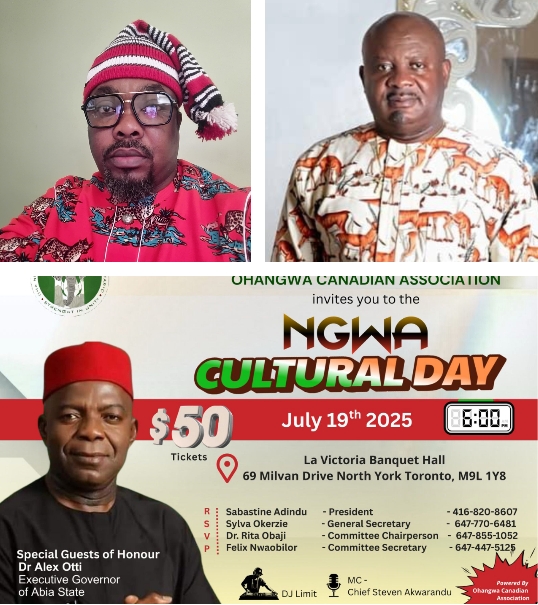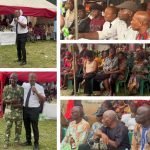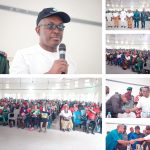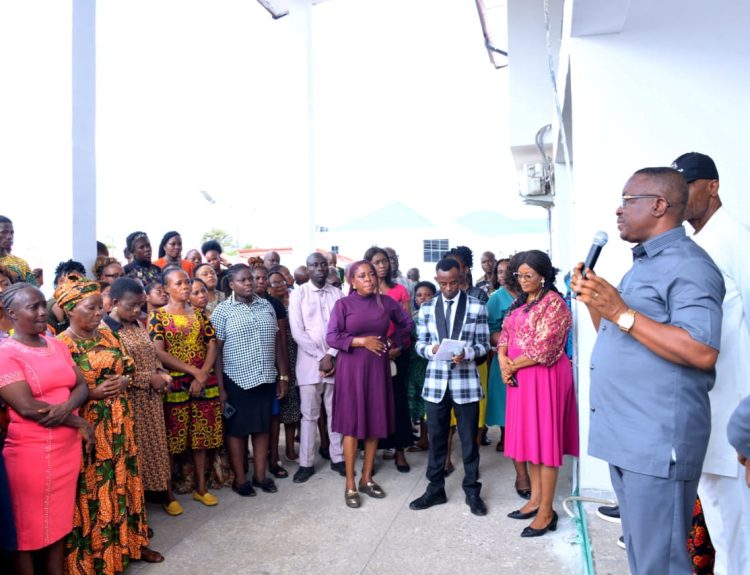The Chief Executive Officer of Jiucodec Nigeria Limited and Managing Director of Success TV Ltd, Hon. Ifeanyichukwu Gideon, has extended his heartfelt congratulations to the President of Oha Ngwa Canadian Association, Mazi Sabastine Obinna Adindu, for hosting the first-ever Ngwa Cultural Carnival in Canada.
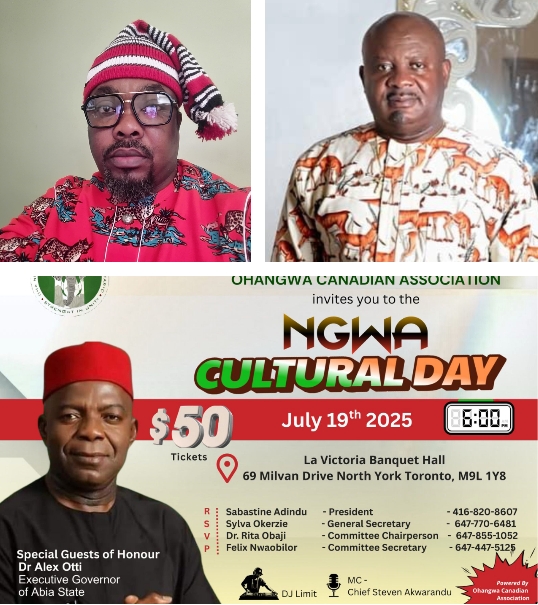
Speaking on the significance of the event, Hon. Gideon commended Mazi Adindu and his Executive for their remarkable organizational effort, which aims at bringing together sons and daughters of Ngwa descent from across Canada to celebrate their roots.
He emphasized that the event marked a milestone in preserving and promoting the rich cultural traditions of the Ngwa people on a global stage.
According to Hon. Gideon, who is also a philanthropist, movie producer and Nollywood actor, the Ngwa Cultural Carnival provides a unique platform to showcase the colorful heritage, language, attire, music, and values of the Ngwa people. “Such initiatives are vital in strengthening identity and pride among younger generations, especially those living in the diaspora.” he stated.
He further noted that the gathering will not only highlight cultural displays but will also serve as a forum to foster unity, community development, and collaboration among Ngwa people residing in Canada. “Events like this remind us of who we are and the beauty of our collective identity,” he added.
Hon. Gideon reiterated his belief that cultural events of this nature play an important role in ensuring that traditions are not lost but rather preserved and transmitted across generations and applauded Mazi Adindu for taking the bold step in initiating such a noble event and urged other cultural organizations in the diaspora to emulate this example.
He further assured the Oha Ngwa Canadian Association of his continued support in their mission to uphold Ngwa heritage, while encouraging all Ngwa indigenes to remain proud ambassadors of their culture wherever they find themselves.
BRIEF HISTORY OF THE NGWA PEOPLE
The Ngwas, the main body of the Ngwa clan, is said to have originated from a village called Umunoha in the present Owerri zone of Imo State Nigeria.
Tradition related to the people of Umunoha village taking a journey in search of new lands in which to dwell, the journey lasted many days, and the group finally arrived at the banks of the great Imo-River Tired, coupled with the fact that Imo River had overflowed to recede, and to find food to eat. The only handy food item then was yam.
One group felt it would be quicker to roast the yams, while the other group preferred boiling the yams. As soon as they were occupied cooking the food, the stream began to rise.Three of the traveling brothers who boiled their yams, hurriedly ate the food, packed up their belongings and crossed over the other side of the river, leaving their kit and kin behind who had adopted the process of roasting their yam.
The three people who gained the left bank of the river were Ukwu, Nwoha, and Avosi in order of age. They were given the name ‘Ngwa’ on account of the expeditious manner of their crossing, while the stragglers on the right bank were named ‘Ohuhu’.
Till this day, all towns and villages on the other side of Imo-River are referred to as ‘Ndi-Ohuhu’ or ‘Umu-Ohuhu’.The villages of the left bank of Imo were inhabited by Ibibios, who received Ngwa Ukwu and his brothers amicably allocating to them sufficient virgin lands for their immediate needs Ngwaukwu settled at what is now the village of Umuolike, where he also established his ancestral shrine.
‘Ala Ngwa’ in a small hut ‘Okpu’ which is today the capital of Ngwa-land called ‘Okpu-Ala Ngwa’.For many years, the three brothers dwelt around Okpu-Ala Ngwa in peace, but as their families increased in number, they moved apart in different directions.
Ngwaukwu group, Mbutu, Ovuokwu, and Ovongwu, and Avosi found the villages of Mvosi and all around Okpu-Ala Ngwa According to the historical account HRH EZE. J. E. N. Nwaguru, the origins of Ntigha and Nsulu, is a bit controversial.
Some say that the Ntigha crossed over from Ohuhu with Ngwaukwu and his brothers, while others say that Ntigha was the son of Ngwaukwu.Whichever is the case, Ntigha settled at Umunachi and established the ala-Ntigha deity, while Nsulu took part of the Juju to settle at Eziala and adjoining villages.
From these early settlements, the Ngwas advanced to the southwest, which include Ihie, Oza, Obegu, Okporo-Ahaba, Osokwa, Arongwa, Amavo, Ngwaobi, and Amise, and to the southeast which also includes Aba-na-Ohazu, Akuma-Imo, Ahiaba-na-Abayi,Amaise Umuokereke Ngwa, Ibeme, Mgboko-Umuanunu, Mgboko-Amairi, Mgboko-Itungwa, Mbutu-Umuojima, Ndiakata, Ohanze,Onicha Ngwa,Owo Ahiafo Ugwanagbo and Uratta.
Customs and TraditionsCustoms and TraditionsNgwas have one custom, tradition, and culture, which we now refer to as ‘Ome na-ala-Ngwa’. He believe in the supreme deity (God), but he equally believed in the lesser deities, for example: Ala (mother earth) Ofo-La Ogu (god of right doing) Ihi Njoku (god of yam), and amadi-Oha (god of thunder).
His music includes Ekeravu for adults, Anyantolukwu, for young girls. Ese dance for a deceased noble man and warrior. Ukom for the deceased noble woman. Wrestling was the most popular game in Ngwa-land. Other cultural festivals were Ikoro and Ekpe dances. Iru-Mgbede for unmarried young ladies.
The Ngwa man, as a farmer, had great regard for land. Some acts and behaviors were regarded as taboo against the land. Such acts included sexual encounters in the bush, sex or marriage with close blood relatives, sexual encounters with your father’s wife while your father is still living, disrespect for the elders, and killing by poisoning. Phrases such as ‘Iru-ala’ were used to describe any of the above acts.
To appease the aggrieved land forms of sacrifice were carried out known as “Ikwa-ala”. Land was the source of wealth of the Ngwa man, and cultivation was tied to the availability of labor. The most dependable source of labor force was the womenfolk. Hence, the average Ngwa man of the immediate past was a polygamist.
The attachment to the land as the principal source of livelihood placed the Ngwa man of the in serious handicap especially in times of disturbances involving moving away from his habitat.Pre-Colonial EraBefore the advent of British rule, the highest political unit of the Ngwa man was the village.
The village government consist of two basic institution the council of Elders to which the heads of the different constitution families and often members of the most senior age grade were represented, and the villages assembly open to all adult males.
The council of elders which was the executive and judicial authority of the villages often met at the village square ‘Ama-Ukwu’ at regular intervals and during an emergency to discuss matters of administrative, economic, religious, social and judicial importance.
The chairman and summoner of the council were often the Onyenwe-ala. In the village assembly, the council of elders would form the executive. There were other sources of judicial authority that justice could be expected.
These were the Juju shrines and the oracle cults, prominent among them was the ‘Chukwu-Abiama’ long Juju at Arochukwu and the ‘Igwe-ka-Ala’ at Umunoha Mbaise Provincial administration was abolished at the end of the Civil War. Some of the changes made after the civil war to bring the government closer to the people included the third tier system.
The presidential system had previously been applied at only the federal and state level of government but now extended to local government levels.
When states were created, the Aba zone, Umuahia zone, and Afikpo zone formed Abia state, with the capital at Umuahia. Today, their territory comprises 7 local government areas in Abia State, namely Aba North, Aba South, Isiala Ngwa North, Isiala Ngwa South, Obingwa, Osisioma Ngwa, and Ugwunagbo This was done by the government for administrative convenience.

